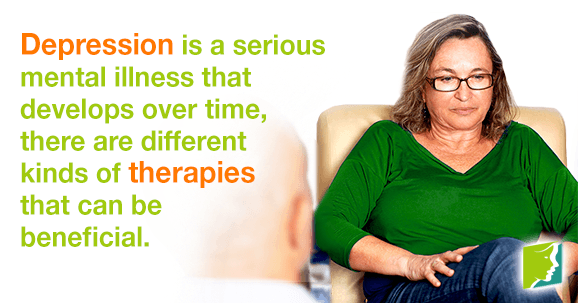Depression is one of the most common mental disorders in the United States, affecting nearly 1 in 10 adults. Unlike the occasional sad mood, depression is a mental illness. There are many forms of depression that can develop because of specific circumstances and affect people differently, including psychotic depression, postpartum depression, and bipolar disorder. It is important to see a doctor and get properly diagnosed if you think you are suffering from depression. There are several kinds of therapies for depression that can be beneficial.
Depression Symptoms
It is important to be aware of the common symptoms of depression in order to be proactive and recognize if you or a loved one is suffering from depression. Depression symptoms can be either physical or emotional. Physical symptoms of depression can include fatigue, insomnia, changes in appetite and weight, body aches, cramps, and headaches. Emotional symptoms include thoughts of suicide, irritability, apathy, and feelings of helplessness, guilt, and worry.
Depression Therapies
There are many types of talk therapies each one offering different benefits. Talk therapy is a broad term that includes many different schools of therapy. These include:
Psychotherapy
There are many types of psychotherapy, but they essentially involve talking about your past in order to treat present problems. Psychotherapy aims for you to learn more about yourself and improve interpersonal relationships.
Psychoanalysis
This is the most common therapy. This type of therapy looks into the patient's psyche and brings unconscious impulses and behaviors to light. The treatment centers on the dynamic between patient and analyst, and it can be difficult.
Cognitive behavioral therapy
Cognitive behavioral therapy (CBT) is an effective treatment for depression. It analyzes negative thoughts, and aims to train you how to think positively. This type of talk therapy is geared toward solving immediate problems. It also involves “homework”: the therapist may ask you to track your moods or practice new ways of thinking.
Family therapy
Family therapy is a short-term treatment option. This kind of therapy can involve the whole family, and explore the interpersonal relationships and issues within the family.
Group therapy
There can be up to 12 people in a group therapy session that meets together regularly with a therapist. This kind of therapy can be helpful for people who share common problems, so they can offer support and advice to each other.
These types of therapies can be effective in treating depression by being able to talk about what you are going through. Therapists may also prescribe medication in addition to therapy, depending on the severity of the depression. Depression is a serious mental condition that should be treated because symptoms can worsen if left untreated. It is important to be aware of the symptoms of depression in order to recognize them and seek treatment early. Like talk therapy, there are other alternative therapies for dealing with depression.
Sources
- Markowitz, J.C. & Weissman, M.M. (2004). Interpersonal psychotherapy: principles and applications. World Psychiatry, 3(3), 136-139. Retrieved from http://www.ncbi.nlm.nih.gov/pmc/articles/PMC1414693/
- National Health Service UK. (2014). Clinical depression. Retrieved September 16, 2014, from http://www.nhs.uk/Conditions/Depression/Pages/Treatment.aspx
- National Health Service UK. (2014). The types of therapy. Retrieved September 16, 2014, from http://www.nhs.uk/Conditions/stress-anxiety-depression/Pages/types-of-therapy.aspx
- National Institute of Mental Health. (n.d.). What is Depression? Retrieved September 16, 2014, from https://www.nimh.nih.gov/health/topics/depression/index.shtml




